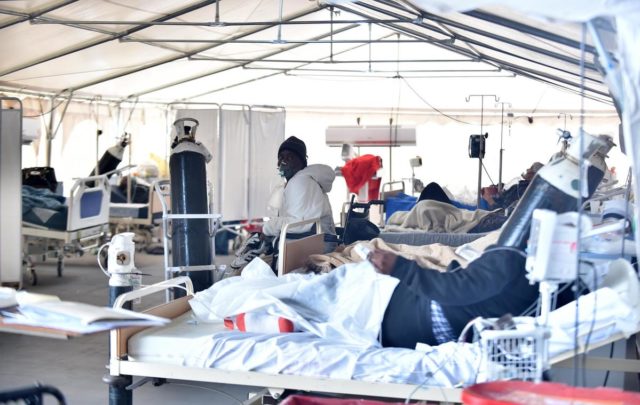
AS CASES of Covid-19 surge in Gauteng, the Department of Health is increasing capacity at hospitals and has set up field hospitals in tents as it expects a dramatic increase in admissions.
On Friday Minister of Health Dr Zweli Mkhize inspected the readiness of a tent site adjacent to the Tshwane District Hospital and Steve Biko Academic Hospital.
The government, province and City of Tshwane have also identified the Tshwane events centre, Dr George Mukhari Hospital in Ga-Rankuwa and Kopanong as areas where anticipated extra needs can be met.
This comes as the premier, David Makhura, became South Africa’s third provincial head to test positive for Covid-19. He is self-isolating at home. After experiencing mild symptoms the premier decided to get tested on Wednesday.
Makhura revealed his infection status a day after his Health Department said six members of its “Covid-19 War Room” had contracted the virus, including the head of the provincial Health Department, Professor Mkhululi Lukhele.
Two other provincial premiers, Alan Winde of the Western Cape and Job Mokgoro of North West province, have also tested positive for the virus. Winde has type 2 diabetes and is monitoring himself at home, while Mokgoro is in hospital in Joburg.
South Africa’s confirmed coronavirus infections have been accelerating as lockdown restrictions are eased. Cases rose by 13 734 to 238 339 on Thursday, the biggest single-day rise since Mkhize confirmed the virus in South Africa on March 5.
Speaking on Friday, Mkhize said these areas were being prioritised because of the number of cases needing medical care, which were expected, with the emergency intervention team due to provide 1 000 beds in the capital over the next two to three weeks.
He said the decision on how to manage the disease was an ongoing one, and that the government was working with the province and city to do assessments and make decisions on where patients should go, depending on how ill they were and the demand at the facilities.
He once again referred to the storm being upon the province, which is taking over from the Western Cape as the epicentre of Covid-19 in the country.
The number of confirmed cases in Gauteng has surged to over 84 000.
“What we are seeing in Gauteng is not surprising but we must be vigilant and concerned as we are now going to see the peak of the pandemic (and) we expect that there will be lot of pressure on hospitals and beds.”
The initial strategy had been to designate a few hospitals for Covid-19 patients, but the pattern of the spread had led the department to change tactics and opt for reduced occupancy of beds in hospital wards and the addition of field facilities.
“We have not reached capacity yet, but we are at a level where we can see the number of admissions is rising very fast.”
He said after an emergency meeting, a national intervention unit was established to look at also putting temporary beds in tents near hospitals.
Mkhize said patients should not take being told to go to bed in a tent as not receiving proper treatment. Rather it was a way to manage the system to investigate, isolate and treat those who were not as ill and leave hospital beds for those who needed them most.
The increase in cases is not unexpected with more economic activities open – and the height of the virus is expected between the end of July and early September.
“Following consultations, there was a view it was safe to open for economic activities as well as schools. We are acknowledging that we have to co-exist with the virus, and learn new ways of how to cope,” Mkhize added.
To date more than two million tests have been done in South Africa.
Meanwhile, Gauteng Health MEC Dr Bandile Masuku has denied claims of a tender to dig 1.5 million graves in Gauteng in preparation for anticipated Covid-19 deaths.
Responding to a call by Solidarity for a probe into the alleged tender for the graves, he said the figure represented the capacity of graves, but denied there was a tender to dig them.
“What has occurred is not about digging, it’s not about tenders, there are no grave sites that are being dug,” said Masuku.
“All the preparation that we’ve put in place is about saving lives,” he added.
Solidarity has questioned forecasts for the number of Covid-19 deaths and said 1.5 million deaths would represent 10% of the province’s population.







